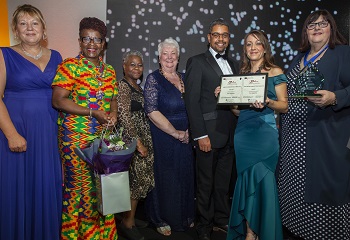
Nurse of the Year Winners 2018
Congratulations to all our winners and runners up at the 2018 RCN Wales Nurse of the Year Awards. In our seventh year we have once again seen the best and brightest talents in the Welsh Nursing family!
RCN Wales Nurse of the Year 2018
Sponsored by Velindre University NHS Trust
Eve Lightfoot is named the RCN in Wales Nurse of the Year 2018!
Eve, a District Nursing Sister within Hywel Dda University Health Board, became increasingly concerned that there was no education for staff about sepsis or the early recognition of deterioration in patients in the community.
She began to raise awareness of the issue, started a research internship and undertook a research project. Her work is now leading to sustainable change not just locally but also on a national level.
Eve was a unanimous choice for the judging panel, demonstrating passion, unwavering commitment and determination. They recognised that she has been driven to improve patient safety and empower nurses to make decisions which enhance patient outcomes.
Helen Whyley, Interim Director, RCN Wales, said: “Eve is a great role model not only for nursing in the community but for nursing as a whole in Wales. She is an inspirational leader who is skilled in influencing and achieving significant change across care sectors. Eve has gained huge respect from all those she works with.”

Eve Lightfoot (second from right), pictured with (from left) Helen Whyley, Interim Director, RCN Wales, Dr Cecilia Anim CBE, RCN President, Dame Donna Kinnair, Acting RCN Chief Executive and General Secretary, Gaynor Jones MBE, Chair of RCN Welsh Board, Vaughan Gething AM, Cabinet Secretary for Health and Social Services, and Professor Donna Mead OBE, CStJ, FRCN, Chair of Velindre University NHS Trust (pictured right of Eve)
Page last updated - 03/08/2019





